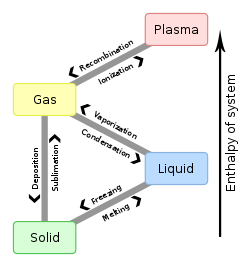Superglass
A superglass is a phase of matter which is characterized (at the same time) by superfluidity and a frozen amorphous structure.[1]
J.C. Séamus Davis theorised that frozen helium-4 (at 0.2 K and 50 Atm) may be a superglass.[1][2][3]
See also[]
- Superfluid
Notes[]
- ^ a b Giulio Biroli; Claudio Chamon; Francesco Zamponi (2008). "Theory of the superglass phase". Physical Review B. 78 (22): 19. arXiv:0807.2458. Bibcode:2008PhRvB..78v4306B. doi:10.1103/PhysRevB.78.224306.
- ^ "Press release: Supersolid or superglass? Cornell researchers study a strange state of matter in helium - Cornell Chronicle".
- ^ Yu, Xiaoquan; Mueller, Markus (2011). "Mean field theory of superglasses". Physical Review B. 85 (10): 104205. arXiv:1111.5956. Bibcode:2012PhRvB..85j4205Y. doi:10.1103/PhysRevB.85.104205.
References[]
- Superglass could be new state of matter (subscription required)
- A new quantum glass phase: the superglass
- Phys. Rev. Lett. Vol.101, 8th Aug 2008
Categories:
- Condensed matter physics
- Phases of matter
- Glass physics
- Physics stubs
